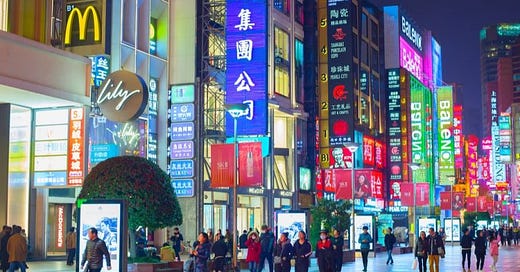The Route to Revival? Self Reliance
Insights from China and the Gulf’s Economic Paths to Prosperity
I've been to China a few times now.
Every time I go, I’ve gone via a stopover in the UAE.
The contrast between the Gulf and China is fascinating.
Both are places with vast wealth and even bigger ambitions.
China really opens your mind as to how huge the world really is.
The Gulf really makes you realise the art of the possible.
The speed of change and transformation from just 30 years ago to today is unrecognisable.
As they say, there’s more than one way to skin a cat. This is very prevalent in the methods both regions have taken for their rise.
One of the things I notice most about these two powerhouses is that their route towards building their riches.
The Gulf has embraced an internationalist approach.
Come one, and come all.
They welcomed global brands with open arms, turning their cities into hubs of tourism and commerce. Walk through the malls, and you’ll see household international names from every corner of the world such as Bloomingdale’s, Shake Shack and Tim Hortons to name but a few.
China, on the other hand, rejected this.
They chose self-reliance.
Instead of relying on imported brands, they built their own:
No Visa? They have UnionPay.
No YouTube? They have Youku.
No Google? They have Baidu.
No WhatsApp? They have WeChat.
No Uber? They have DiDi.
No Amazon? They have Taobao.
The only Western brands that had penetrated through were the usual suspects - Coca-Cola, McDonalds, Apple, Starbucks and Lego.
China wasn’t interested - seemingly they had trusted their own people to create the technology and infrastructure they needed - a slow, strategic approach to becoming the dominant global power.
Even the all-conquering Amazon dedicated 15 years to breaking through, before exiting in 2019 with less than a 1% market share. Tesco, Walmart, Nike and Airbnb were other notable failures.
It has even swung the other way where now Chinese companies have scaled internationally into foreign markets. AliBaba, Lenovo, DJI, Huawei and of course TikTok are household names. BYD are big in the EV industry.
The recent RedNote phenomenon adds another to the list.
"Through foreign trade, people's satisfaction, merchants' profits and countries' wealth are all increased." - Ibn Khaldun
Meanwhile, other than the airlines and Aramco - how many other Arab-owned global brands can you think of?
The Chinese approach really resonated with me.
They focused domestically - one demographic, huge scale (1bn+), one language. Build super companies that are independently powerful.
Expand from a position of strength.
The Islamic world has over a billion people too, albeit with linguistic diversity.
But why couldn’t we take inspiration from China?
Why couldn’t we build our own ecosystems of tech, culture, and innovation - grounded in our shared values and purpose?
The lesson is clear. Self-reliance is powerful.
Of course - it's not easy. There are 57 countries, for starters. 57 different leaders, languages, laws. So it's certainly super challenging.
But a mindset shift is definitely needed for revival.
What’s stopping us from taking the same leap of faith in our own people?
What are your thoughts? What do we need to do, to have this type of culture and mindset shift in the Muslim world?
Ready to delve deeper and take action? Here's how you can get involved:
Download the Free eBook: Unlock the secrets of using leverage effectively with our free eBook, "Unlocking Leverage". Discover strategies on how Muslims can begin to punch above our weight. Download Now
Watch the Video Presentation: Take 17 minutes to watch our video presentation outlining actionable steps for reviving a Second Golden Age of Islam. Learn how self-reliance and innovation can reshape our future. Watch Here
Join Our Community: Connect with like-minded Muslims passionate about revival. Share ideas, collaborate on projects, and inspire each other as we strive towards a cultural and mindset shift in the Muslim world. Join Now







